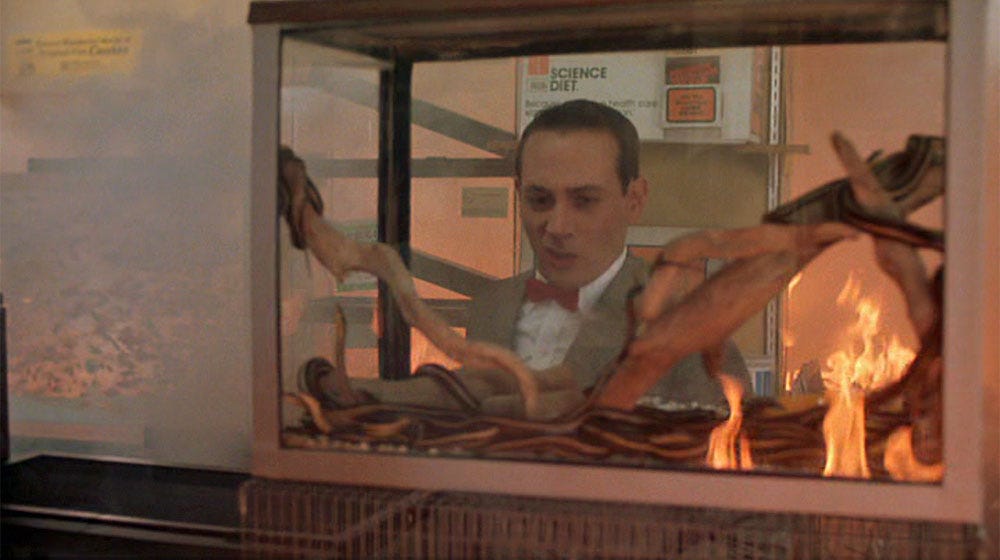
Before I get to today’s topic, I want readers to know that, for weeks, I’ve been thinking about writing a column about attendance and discipline. It’s a hard topic, and I have not settled on what approach I want to take. I feel like Pee Wee Herman rescuing the animals from the pet store that’s on fire, where attendance issues are the terrarium full of snakes that Pee Wee keeps avoiding until he can avoid it no longer (watch it here).
I am going to avoid the handfuls of snakes topic of attendance for another week or two, and write instead about time theft. Time theft is the term for “stealing time” from one’s employer by doing things like clocking in and leaving, or having someone else clock in for you when you aren’t there to work. Time theft is a little bit like attendance misconduct in that the employee is not performing work that is expected from them, but it’s more serious, because there is fraud or deception involved.
Theft sounds bad, right? And many collective bargaining agreements make theft and dishonesty the basis for summary discharge. They are so-called “cardinal sins” of the workplace, along with misconduct like violence or drug usage at work. Despite the seriousness of theft, some employees convince themselves that it is harmless to have a co-worker clock them in when they are running late. After all, it’s just a few minutes, right? Other employees convince themselves it’s fine to go sit in their car or even go home to rest when there was no work to be done at the warehouse, for example.
Unfortunately for the workers who convince themselves of the “no harm no foul” nature of these incidents, most arbitrators take them as seriously as the employer does. Time theft undermines two workplace principles:
The wages and benefits of the CBA are compensation for the labor of the employees, and people are paid to work when they are on duty.
Employees can expect that they will be treated with dignity at work and in exchange, employers can expect that they can trust their employees to do their job while they are on the clock.
I’ve had a number of cases involving time theft where the employee was in a low-supervision position, like a delivery driver or warehouse worker or healthcare worker, who was expected to work even when no one was around to watch. That is a position of trust that is violated when an employee does not work when they’re away from their supervisor’s watchful eye.
There are many jobs which do not require constant work. For instance, employees may need to wait for a delivery in order to begin working, or they have a task-specific job that is dependent on other people completing their work. Stagehands, for example, may be idle during parts of a performance. In those cases, employees are often permitted to wait in a breakroom or outside the facility. However, they are subject to the parameters set by their employer. If the rule is that you can hang out in the breakroom waiting for the 11:00 pm delivery, the break room is where you must wait. You can’t go home, or run errands, or go out to eat. The employee is being paid to wait. In an arbitrator’s view, the management right to assign work means that management can also NOT assign work on occasion but still expect an employee to be on site.
For workers who think this is absurd, an arbitrator might agree that it’s not a good management practice, but they will still find the employer had just cause for discipline if that employee decided to leave the workplace rather than stay available to work.
The union is not without recourse in the situation where there are long spells of waiting that feel unproductive to the workers. The union could negotiate different shifts, different break rules, or standby and waiting pay. In one case I had, the employer’s “light duty assignment” for an injured worker was that they had to sit in the breakroom and wait for other light duty assignments that never seemed to appear. It’s hard to understand why an employer would want to pay employees to do nothing, but that was this employer’s choice. Given the evidence, I had to uphold the discharge of an employee who hated sitting in the breakroom and went to sleep in his car instead. The union could have negotiated a different injury accommodation process but have not done so as far as I know.
Many unions might find this to be a harsh outcome but it is reasonable that employers expect their employees be available to work as directed when they are on the clock.
Okay, I promise I will eventually get to attendance. I’d love to hear what questions you have about labor arbitration and grievance handling. If you know someone who would find this newsletter valuable, please share it with them.



